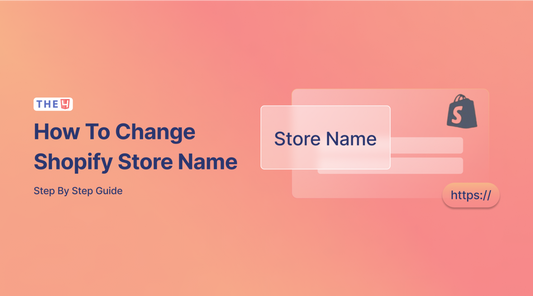Table Of Content
Shopify vs WordPress 2024: Which Is Better for Your Online Store?

Navigating the landscape of e-commerce and website building in 2024, two behemoths emerge as the leading platforms - Shopify and WordPress. Each platform has etched its reputation in the digital sphere, boasting unique strengths and distinctive features, along with a massive user base that stands testament to their prowess. However, the decision between the two is far from a straightforward pick.
In this blog, we will compare the differences between Shopify and WordPress, and analyze their pros and cons. Whether you are an aspiring entrepreneur starting a new business venture or an existing business owner looking to pivot online, our goal is to help you differentiate which platform in your business. Some of these platforms - Shopify or WordPress - are best suited to your specific business needs and goals.
Before going into the details, make sure you have built an eCommerce store on Shopify!
What is Shopify?

Shopify is a leading e-commerce platform designed to help businesses set up online stores and sell products. It's a subscription-based software that allows anyone to set up an online store and sell their products, whether physical or digital.
Founded in 2006, Shopify provides a range of services including payments, marketing, shipping and customer engagement tools to simplify the process of running an online store for small merchants. Its user-friendly system allows store owners to customize their storefronts, organize their products, track orders, and manage inventory, among many other things.
Moreover, it comes with a variety of themes and apps that you can install to enhance the functionality of your store. You can also sell your products directly on social media platforms or marketplaces, thanks to its integrations.
According to Builtwith, there are now over 4.12 million e-commerce websites built using Shopify
What is WordPress?

WordPress is a powerful, open-source content management system (CMS) that allows users to build and manage their own websites. It was first released in 2003 by Matt Mullenweg and Mike Little as a blogging platform, but it has since evolved into a versatile CMS capable of creating a wide variety of websites.
WordPress operates on a plugin architecture and a template system, allowing users to extend its features and functionality and customize the appearance of their sites. According to HubSpot, as of 2022, there are almost 60,000 free plugins in the official WordPress plugin directory.
There are two main versions of WordPress:
- WordPress.org, also known as self-hosted WordPress, which is a free, open-source software that you install on your own web host. It offers full control over your site and the ability to modify everything down to the code.
- WordPress.com is a commercial service where WordPress hosts your site for you. It’s simpler to set up, but offers less control and customization options.
What are similarities and differences between Shopify and WordPress?
As we navigate the world of e-commerce, two powerful platforms often take center stage: Shopify and WordPress. Both robust and highly capable in their own right, they offer diverse solutions for businesses looking to carve out a corner in the digital marketplace. In this section, we'll embark on a detailed exploration of the similarities and differences between these two platforms.

Similarities between Shopify and WordPress:
Navigating through the landscape of Shopify and WordPress reveals shared attributes between these platforms. Let's break down these similarities into key points:
- ECommerce Capabilities: Shopify, a platform built for e-commerce, and WordPress, a flexible content management system that can be expanded into a robust e-commerce site with plugins like WooCommerce, both offer reliable solutions for various online selling needs. These needs can range from physical goods to digital products and services.
- Customization: Both platforms prioritize customization, providing an array of themes and options to create a unique look and feel for online stores.
- SEO Optimization: Shopify and WordPress both come equipped with features for search engine optimization, crucial for driving organic traffic to your site.
- Mobile-Friendly: Understanding the significance of a great shopping experience across devices, both platforms are designed to be mobile-friendly.
- Third-Party Integrations and Community Support: Both Shopify and WordPress boast a wealth of third-party integrations and robust community support, enabling users to enhance their stores and access help when needed.
Differences between Shopify and WordPress:
1. Ease of Use:
In terms of usability, Shopify and WordPress cater to different user bases. Shopify, known for its user-friendly ethos, has a streamlined dashboard designed to assist even the most novice users. The interface is designed with non-techies in mind; it presents a gentle learning curve where beginners can effortlessly set up their store, add products, and manage sales. Each feature is clearly labeled and organized logically, making navigation throughout the platform a breeze. Essentially, Shopify allows users to focus more on the business side of their store, leaving the technical aspects to the platform itself.
In contrast, WordPress is a robust and flexible platform that tends to favor users with a bit more technical expertise. While it does offer a degree of ease with its visual editor (especially if using a page builder like Elementor), it still demands a steeper learning curve compared to Shopify. The WordPress dashboard is more complex, packed with options and settings that could be overwhelming for beginners. Moreover, with the necessity of manually installing and configuring plugins for added functionality, users need to dive deeper into the technical side of website management. This flexibility, while powerful, may add complexity for some users.
2. Design and Customization
Shopify provides a range of professionally designed, mobile-responsive themes that are easy to apply and customize. The platform maintains strict control over the quality and compatibility of the themes available in its marketplace. While the number of free themes is limited, each one is polished, well-designed, and integrated with Shopify's features. However, compared to WordPress, Shopify’s customization options are more restricted. It’s straightforward and sufficient for many users, but may limit those who want to make more specific changes to their site's design.
WordPress, being open-source, is a playground for customization. Its theme repository is vast, offering thousands of free and premium themes. Coupled with powerful page builders like Elementor or Divi, the design possibilities are virtually limitless. However, the open-source nature means quality can vary greatly between themes, and sometimes compatibility issues with plugins may arise. Despite this, if you're willing to explore and experiment, WordPress offers a level of customization unmatched by Shopify.

In both Shopify and WordPress, you can find The4 products. The4 offers premium multipurpose Shopify themes to meet all your needs. Some of The4's outstanding products are Kalles, Unsen, Gecko, etc. Especially, when you purchase one of The4 Shopify themes you get a FREE EComposer Partner Offer that save you hundreds of dollar.
You can find all the4 themes at themeforest.net.
3. ECommerce Capabilities
Shopify shines when it comes to e-commerce. Being a dedicated e-commerce platform, Shopify provides a suite of integrated features that include product listing, inventory management, payment gateway integration, and shipping settings. It's a one-stop shop for anyone looking to start selling online quickly. However, while Shopify excels at providing a streamlined, ready-to-use e-commerce platform, it may not offer the same level of versatility as WordPress when it comes to certain custom features or unique selling models.
WordPress, while not an e-commerce platform by default, can be transformed into one using plugins like WooCommerce. With WooCommerce, you can sell physical and digital goods, manage inventory and shipping, take secure payments, and sort taxes automatically. Coupled with the vast ecosystem of WordPress plugins, you can add almost any functionality you can think of to your online store. While this flexibility is powerful, it requires more setup and ongoing management compared to Shopify's all-in-one approach.
4. SEO
When it comes to Search Engine Optimization (SEO), both Shopify and WordPress have their strengths.
Shopify has built-in SEO features that enable you to edit meta tags, create SEO-friendly URLs, and automatically generate sitemaps. As an e-commerce platform, it's been designed to support SEO best practices, allowing users to edit the alt texts for images, as well as customize page titles and meta descriptions. Shopify also automatically redirects web pages when you change the URL, which is excellent for maintaining SEO when updating your site. However, while the platform offers solid SEO tools, it doesn't allow for as much customization or advanced techniques as WordPress does.
On the other hand, WordPress excels in SEO. It offers a multitude of plugins like Yoast SEO, All in One SEO, and Rank Math that provide granular control over every aspect of SEO. You can set custom URL structures, fine-tune the metadata for each post and page, and control how your site appears in search results. Moreover, with the support of a strong developer community, WordPress plugins are regularly updated to adapt to the ever-changing landscape of SEO. However, all these extensive features also come with a learning curve. If you are new to SEO, it might take some time to understand how to use these features to your advantage effectively.
While Shopify offers simplicity and covers all the basics of SEO, WordPress provides advanced features and flexibility but with a steeper learning curve.
5. Security
Security is of paramount importance for any online business. Shopify takes the security of its merchants very seriously. It provides a Level 1 PCI DSS-compliant checkout, ensuring that all transactions are secure. Moreover, every Shopify store comes with an SSL certificate, ensuring data safety between servers and users. Shopify also handles all updates and maintenance, so merchants don't need to worry about potential security threats from outdated software.
WordPress, being a self-hosted solution, puts more responsibility on the user. While it does offer solid security features, the security of a WordPress site largely depends on the actions of the site owner. Regularly updating WordPress core, themes, and plugins is crucial for preventing potential vulnerabilities. Additionally, users have to manually install SSL certificates and ensure they're compliant with any relevant data handling regulations. There's a vast array of security plugins available to enhance your site's safety, but this also requires active management from the user.
6. Pricing
* Shopify:

Shopify offers a variety of plans catering to different needs and budgets. Here's a condensed comparison:
- Shopify Basic is a great starting point for small-scale merchants. For $29 per month, you gain access to Shopify's main features, including 24/7 support, various themes, and a robust editor.
- Shopify Standard, priced at $79 per month, includes everything in Basic, but with added bonuses. You'll get a detailed reporting tool and the ability to recover abandoned carts, which alone can significantly boost your sales and cover the cost difference.
- Advanced Shopify is a step up at $299 per month. It offers even more detailed reporting and real-time shipping, making it suitable for larger businesses.
Notably, Shopify offers annual plans with significant savings. For instance, with the Advanced Shopify plan, prepaying for a year could save you $1,200! So, if you find Shopify fitting well with your business, committing for a longer period could mean substantial savings.
Keep in mind, Shopify also offers a 3-day free trial to test the waters before you dive in. In essence, there's a Shopify plan for every budget, and the features you get can easily justify the cost, especially considering the potential returns on your investment.
In addition, Shopify is having a free trial program and opening Shopify store for only $1/month (available for some plans)
* WordPress:

While WordPress is technically free to use, there are numerous associated costs that can quickly add up:
- Website Hosting: Depending on your needs, hosting can cost from $5 to $100 per month. Self-hosted shared hosting is cheaper, while fully managed hosting comes at a premium.
- Learning Resources: Learning WordPress may require tutorials or courses, which could be free or up to $50+ per month.
- Themes: Basic WordPress templates can cost between $35 and $50. Premium ones range from $80 to $200, and alterations to the template or a custom design can cost between $300 and $10,000+.
- Plugins: Plugins vary in price, typically from $50 to $500 one-time cost or a $5 to $150 monthly fee. Payment software and membership gateway software have both one-time and monthly costs, while email marketing software usually incurs a monthly expense.
- E-commerce solutions: WordPress’s WooCommerce plugin is free to use, and Ecwid also has a free plan, but to sell unlimited products, Ecwid Unlimited costs $99/month.
Think of the cost comparison between Shopify and WordPress like comparing hotels. Shopify is an all-inclusive resort; it may seem pricier upfront, but everything is included. WordPress, on the other hand, appears budget-friendly initially, but the pay-as-you-go style of adding features can make the total cost add up.
Which platform is best for you?
To help you know which platform is right for you. We did a summary of the pros and cons of both Shopify and WordPress. Please refer it and make the right decision:
|
Shopify |
WordPress |
|
|
Pros |
- You don’t need any coding or technical knowledge to use Shopify - It’s purpose-built for e-commerce websites, so all the sales tools you need are set up for you - You don’t need to pay for hosting or security externally |
- WordPress provides superior power and flexibility compared to Shopify, permitting comprehensive customization - The introduction of its new 'Gutenberg' editor simplifies the user experience - An abundance of helpful resources is available online, including user forums and professional developer guidance |
|
Cons |
- Additional transaction fees ranging from 0.5% to 2% are applied unless you utilize Shopify's proprietary payment system, Shopify Payments - Switching your theme necessitates a content reformat, which can be time-consuming - Despite its user-friendly interface, it lacks the sheer simplicity of drag-and-drop platforms. But you can always use third-party apps like EComposer - Landing Page Builder |
- A substantial level of technical proficiency is required to effectively utilize the platform - Costs can rapidly escalate depending on your needs - Responsibilities such as procuring web hosting, ensuring security, and obtaining a domain name fall on your shoulders |
Frequently Asked Questions
1. Do I need coding skills to use Shopify or WordPress for e-commerce?
Not necessarily. However, having some technical knowledge could be beneficial. Shopify is intentionally built to be user-friendly, and it allows you to establish an online store without any coding skills. WordPress, on the other hand, offers more flexibility but does demand some technical know-how for setting up and customizing (but fear not, once you get past the initial learning curve, operating WordPress becomes almost instinctive).
2. Can I switch from Wordpress to Shopify or vice versa?
Yes, it's indeed possible to switch platforms, but be advised, it can be a multifaceted process. If you're considering a platform transition, meticulous planning and a thorough understanding of the migration process are crucial.
3. Which platform allows me to sell digital products?
Yes, both Shopify and WordPress facilitate the sale of digital products. Shopify comes equipped with integrated features specifically for vending digital items, whereas for WordPress, the addition of a plugin or an e-commerce extension would be necessary for similar functionality.
Read more: Shopify Website Builder Tutorial: Step-by-Step guide for beginners
4. What does open-source mean?
Open-source software is akin to a grand feast where the culinary maestros have generously decided to share their secret sauces with the world. They make their source code public, enabling anyone to explore, adjust, and distribute it. It's like a communal dining experience where everyone brings their specialty dish to the table. Individuals are free to savor, refine, or even recreate their versions of these gastronomic delights. In the same way that a diverse potluck encourages collaboration and sparks culinary innovation, open-source ethos enhances creativity and cooperation in the software realm.
Final thoughts
In summary, both Shopify and WordPress are powerful contenders in the realm of online platforms. Your choice ultimately depends on your specific needs, skills, and business type. Shopify offers a straightforward, comprehensive solution, while WordPress presents more customization possibilities at the cost of a steeper learning curve. Remember, as we step into 2024, the true success of your online store hinges on your offerings and how well you connect with your customers, regardless of the platform you choose.
We hope this blog has helped you in choosing a platform to start your business with. If you want more information or want to learn more about EComposer, follow us at ecomposer.io or click on the message icon located in the right corner of the screen.
=================
Add EComposer Next generation page builder Here
Follow Us on Facebook
Join Official Community













No comments